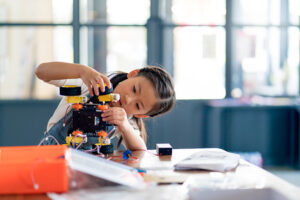5 ways that ICAS helps build your child’s future employability: STEM skills

The world keeps changing as digital technology becomes more deeply embedded in our lives, particularly in our jobs. Many jobs have disappeared, and new jobs are constantly being created. Employment and career focus is also becoming much more fluid than it ever was for previous generations; most people entering the workforce are likely to change professions between three and seven times during their working life.
STEM education integrates science, technology, engineering and mathematics knowledge and skills. The aim of STEM education is to train qualified individuals to meet 21st century workforce needs, to find solutions to complex problems and global problems and to improve their real-life situations.
The STEM skills gap is not a new talking point in the media or education stakeholders, especially in Australia. Lively debate continues about what exact percentage of new jobs will require STEM skills within the next decade – and some have even claimed that it will be as much as 75%. It is similar to the demand among employers for soft skills, which we explored in a previous blog post.
What we do know for certain is that as technology and automation disrupts more and more industries, there’s a real concern that there won’t be enough STEM-qualified young Australians to fill these jobs.
Here’s how taking part in ICAS Mathematics, Science or Digital Technologies helps build your child’s future employability by developing the following skills at the core of STEM.
1. ICAS helps students integrate STEM subjects with their existing knowledge, as well as real-world and new information
The questions in the ICAS competition help students to connect information from content strands of the curriculum to their existing knowledge and to real life, making their learning meaningful.
ICAS evaluates skills that are integrated throughout all the STEM subjects, particularly skills that involve:
- Collecting data
- Manipulating data
- Evaluating data
- Presenting data
For example, ICAS Science skills include observing, measuring and interpreting data. These integrate with ICAS Mathematics skills such as numbers and arithmetic, measurement, chance and data, and space and geometry. Additionally, ICAS Digital Technologies skills include working with graphics and multimedia and understanding spreadsheets and databases.
Making connections
ICAS subjects also test problem-solving skills that require students to contextualise their existing knowledge. These fundamental maths, science and digital technologies skills are essential not only for careers in science, engineering and IT, but also for professions across finance, banking, economy, media and communication.
These types of ICAS questions challenge students to make connections between their existing knowledge and new information. For example in ICAS Science, questions often include novel contexts that students may not have seen before or are seeing in a new light. We provide information or ‘scaffolding’ so that students can integrate this with their existing knowledge in order to work out the answer.
Realistic, real-world contexts
An important feature of ICAS questions is that they draw on real-world, believable contexts. We do not ask conceptual questions that float in a void. For example, a Mathematics question about percentages will be set in scenario involving the remaining percentage of memory available (in megabytes) for storing photos on a smartphone. Science questions include familiar contexts such as yo-yos, parachutes and glow-sticks. Graphics, photos and videos further engage students and put questions into a familiar visual context.
2. ICAS gives students’ higher-order thinking and problem-solving skills a healthy workout
The beauty of ICAS questions is that no one can rely on memorised, rote knowledge to answer them – including the ones we post to our adult audience on our Facebook page!
The questions instead push students to draw on their cognitive skills such as higher-order thinking and problem-solving, and these increase in complexity throughout the paper. ICAS Science and Mathematics both test reasoning and problem-solving specifically but these skills are also needed to answer questions that require students to interpret, predict and conclude from data in a variety of subjects.
Creative problem-solving skills are critical for students to be able to adapt to the changing global community, preparing them for jobs that might not even exist yet. What’s more, even amid AI disruption new types of jobs will emerge that can only be filled by humans, requiring the kind of creative problem-solving that cannot be replicated by a computer.
3. Sitting the ICAS test builds competence in digital technologies
The ability to use information and communication technologies effectively is a requirement for most jobs – not to mention for obtaining goods and services in our everyday lives. Even so, many employers cannot find enough workers with the level of digital technology skills that they need.
Although most young people are now digital natives who are comfortable with technology, they still need to know how to use it efficiently, appropriately, optimally and safely. ICAS Digital Technologies tests provide valuable feedback to teachers, parents and the students themselves on their ability to navigate our ever-increasing digitised world. The test aims to engage students, encourage curiosity and reflection, and link contexts to the real world.
In line with the goal of increasing digital competency, engagement and relevance, ICAS itself is digital – it has moved away from paper and now all tests are conducted online. Interacting with the test platform and getting accustomed to navigating through the online ICAS questions and features, is in itself building STEM skills that will be essential in students’ future employment contexts.
4. Fact vs fiction: the questions in ICAS extend students’ scientific literacy
In a world bombarded with readily-available information published by sources with varying agendas, it is increasingly difficult to distinguish fact from fiction. Building scientific literacy in students enables them to make important decisions and judgements based on proven facts, research and knowledge rather than opinion. Future careers across numerous sectors will depend on this type of competence and discernment.
Scientific literacy is knowledge of science as well as knowledge of the process of doing science, known as the scientific method. This is used to ask, test, and answer questions about the world around us. Although some knowledge is assumed, ICAS Science evaluates science skills rather than knowledge. These skills are foundational: they include observing, investigating, interpreting, predicting and concluding. They’re the basis for collecting empirical evidence which is needed for a range of professions, not just in science. Backing your decisions with data is a crucial competency of a range of professions.
5. ICAS gives students the experience of data science skills in action
The ICAS STEM subjects test students’ understanding of how to evaluate and manipulate data, skills that later become fundamental in data science.
Modern devices such as smartphones and smart TVs are constantly gathering and transmitting data. Our increasing use of these devices has contributed to a massive explosion in data, and a growing need for industry, science and healthcare to create better services and products.
Data science is the study of data collected from the internet, smartphones, business and other sources. It involves developing methods of recording, storing, and analysing data. The goal of data science is to gain insights and knowledge that are free from bias, from any type of data. By sitting an ICAS test, students are getting an experience of data science skills in action – skills that can be applied into a variety of settings, including their future workplace.
In conclusion…
The questions in the ICAS competition are a training-ground for the core skills at the heart of STEM. In tackling them, young people build the type of creative problem solving, discernment and analytical thinking that will prove essential to future employers.
Sales are open for this year’s ICAS across all subjects. Sign up to the competition here >



